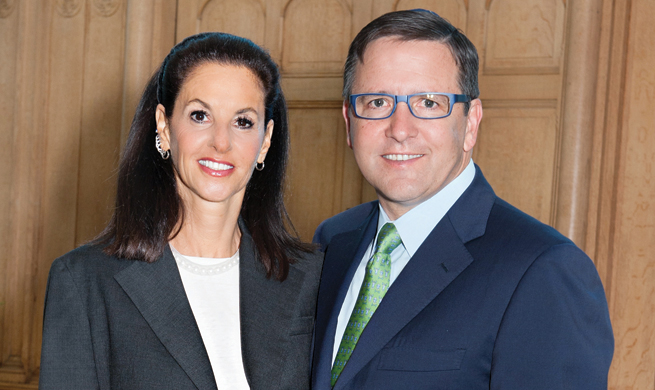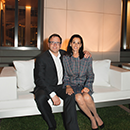Anthony “Tony” Pritzker thinks a lot about family values: How they have defined him, how they are created, how they evolve, and how they are transferred from one generation to the next.
Pondering the evolution of family values has Tony and his wife Jeanne sitting with their two middle children on a warm Friday night in early September. They gather together to play a game of cards. But this is not a game of strategy or deception, where one tallies a winning score and learns to outwit opponents. These cards hold Motivational Values, wherein each card in the deck depicts a personal, philanthropic, or financial value. Each Pritzker takes 25 cards and has 10 minutes to rank the cards in groups of five – the first group being those values held most near and dear to the heart and mind, and the last group being those values the person could easily shed.
“The question is how do you transfer family values to your kids,” says Tony, sitting with Jeanne at his side in the foyer of their Benedict Canyon home. “I’m not sure how it’s done. It’s done a little bit by modeling, a little bit by osmosis, sometimes you say what those values are.”
Like many parents, the Pritzkers view their children as an extension of themselves – their behavior a living example of the values that inform their lives. For Tony and Jeanne, those values include the concepts of leaving the world better than when you met it and the Jewish concept of tikkun olam – repair the world. Coming together to play these games with their children gives the couple ample opportunity to reinforce core family values. On successive nights, in groups of two, they played the Motivational Values card game and asked their children to list their values, from most important to least, while they did the same.
“Opportunity was one of my top five,” Tony reveals.
That choice may seem ironic, because opportunity is something Anthony Pritzker has always had in spades. As one of three children of the late Donald Pritzker, co-founder of the Hyatt hotel chain and heir to Marmon Holdings Inc., Tony recently inherited more than $1 billion after the Pritzker family’s $15 billion fortune was split among 11 cousins.
SEIZING OPPORTUNITIES
In 1996, with his brother, Jay Robert (J. B.) Pritzker, Tony co-founded New World Equities, a venture and private investment firm. The company assumed its current form in 2002 with the name change to Pritzker Group. The firm has made long-term investments in family-run and entrepreneurial businesses totaling about $1 billion over the past 12 years.
The brothers invest “proprietary capital” and so are free of outside influences that do not fit their corporate culture or values. They partner with family-owned corporations, typically purchasing a controlling share, and make strategic decisions based on the purchased company’s long-term objectives, as opposed to liquidating to facilitate an early exit.
“When you’re buying a family business, they have made a mark in their community,” Tony says, referencing a business Pritzker Group purchased in upper Wisconsin. Companies located in small towns are living, breathing entities: They employ the local populace and invest in community-based projects. This particular company in Wisconsin had built a community center that residents used on a regular basis, and Pritzker Group kept that community center’s doors open. An aspect of company culture mandates supporting the purchased company’s philanthropic efforts, both externally and internally, he says.
Pritzker Group operates within three principal investment areas: Private Capital (which acquires and operates North America-based companies) Venture Capital (which provides multi-stage funding to U.S. tech companies), and Asset Management (which partners with top-performing investment managers across global public markets).
The venture capital aspect of the company operates under starkly different priorities than those of private equity. For example, short-term profitability for investors is a key objective. Helping entrepreneurs build market-leading technology companies at every stage of their growth, Pritzker Group Venture Capital works closely with entrepreneurs at more than 100 companies. Successful exits in recent years include Fleetmatics (NYSE: FLTX), SinglePlatform (acquired by Constant Contact), Zinch (acquired by Chegg), Playdom (acquired by Disney), LeftHand Networks (acquired by Hewlett-Packard), and TicketsNow (acquired by Ticketmaster).
The Pritzker cachet may be awe-inspiring, but it does not quell Tony’s professional drive. He characterizes the family wealth as a “high-quality challenge” that propels him forward. “You want to make your mark and not be completely overshadowed by your family name,” he says, acknowledging “J.B. and I were so fortunate … we do everything we can to not besmirch our family name.”
Tony seeks to refute preconceived notions of an isolated disconnect that comes from a life of privilege. He does this in business and his private life, whether it is by partnering in and infusing equity into a family-run company to increase its profitability while maintaining and increasing the purchased company’s community outreach, teaching his kids the importance of philanthropy, or creating and funding nonprofit organizations that raise awareness about the environment, art, or Los Angeles’ foster families.
“Opportunity, to me, means everybody having an equal opportunity to excel,” he says, adding that an overarching Pritzker Family goal is to “get involved, have an opinion, and actively work to better the world.”

Anthony and Jeanne surrounded by a sea of duffel bags with donated goods
PHILANTHROPIC ORIGINS
Charitable work is what drew the couple together in the first place. Tony and Jeanne met while both were serving on the Michael Reese Junior Medical Research Council. The aim was getting young professionals involved in raising funds for the hospital, which at the time was a major research and teaching hospital and one of the oldest and largest hospitals in Chicago.
Three decades later, the couple’s charitable endeavors have deepened and broadened. Not only are Tony and Jeanne members of several educational and philanthropic boards, they also launched the Anthony and Jeanne Pritzker Family Foundation to fund philanthropic causes in the areas of education, environmental sustainability, health, and social services. The Anthony and Jeanne Pritzker Family Foundation has donated more than $44 million over the past 10 years to various causes including medical research, education, Jewish life, environment and foster youth. Most recently the foundation made a $20 million commitment to UCLA for the environment and sustainability, guardian scholars foster youth program and the arts.
Foster children and families is a cause about which Jeanne is very passionate. In 2008 she launched Foster Care Counts, a branch of the Anthony and Jeanne Pritzker Family Foundation that helps Los Angeles’ foster parents care for and nurture the city’s foster children and guides foster youth as they leave the system and attempt to become successful young adults. There are close to 28,000 foster youth living in LA County. While it’s tempting to dismiss the issue as specific to Los Angeles’ East or South sides, this number is about 7 percent of the total U.S. foster youth population.
“It is our tax dollars that are paying for these kids, and if we’re already investing,” reasons Jeanne, “then why don’t we step up and increase our investment a little and help the county and public sector improve outcomes for foster kids?”
Less than 50 percent of foster youth graduate from high school, and only 3 percent graduate from college. Of the foster children who have aged out of foster care, 50 percent end up homeless or incarcerated, according to Alliance for Children’s Rights.
“When I first met foster families I realized that here’s a group of people working even harder than I am,” says Jeanne, who has no small task as the mother of six children. “These parents step in and do the job selflessly.”
Jeanne created Foster Care Counts the week she was preparing for her eldest son’s bar mitzvah, which was to take place on the Saturday evening before Mother’s Day. As she and her friend worked on the plans, her friend thought it would be a great idea to use the event space and set up on Sunday to host a nonprofit. The rental equipment was not to be picked up until Monday morning, so the venue still would be furnished and ready to host. Jeanne called a psychologist friend who counseled for Los Angeles County social service agencies, and in three days they organized the first Foster Care Counts mothers’ celebration. It has become an annual happening, and last Mother’s Day the event paid tribute to 2,000 foster mothers.
Ultimately, Jeanne plans to build out the organization by creating an e-mentoring system pairing foster kids with mentors who work in the corporate world. Outcomes for foster children are bleak while in the system, but things typically get worse after they have left it. Having adults to model their lives after is what foster children need most, she says.

Anthony with UCLA Chancellor Gene Block
PROFESSIONAL PARENTS
Jeanne spent years in the corporate world as an investment banker before becoming a parent. Following her years in investment banking, she partnered with a friend in an entrepreneurial project that made low-fat, healthy snack foods. While working in her corporate and entrepreneurial worlds, Jeanne had no desire to be a mother; her plan was to continue building her career.
“But then Tony said that if I wanted to stay at my job, then I had to have kids, so I said, ‘fine, bossy,’” she recalls, shooting a wry smile toward her husband. “I got pregnant that night, and I was pregnant for a solid decade afterwards.”
Being a mother felt perfect to her.
“It’s much harder, and that’s what I liked about it,” says Jeanne, referring to the challenge of juggling parenting/work responsibilities. “You have to know what you’re doing and yet you can never know what you’re doing. The life-long learning in motherhood can have immediate and serious consequences that don’t have to do with quarterly returns and things that are removed from you.”
The skills and responsibilities involved in being a good mother get short shrift in American culture. Parenting is a privilege and a duty, and foster parents – who willingly take on challenging situations in the name of instilling stability and guidance into a child’s life are worthy of great respect, Jeanne says.
“To me, [as someone] who left investment banking and entrepreneurship to be a mother, [parenting] is the most valuable skill. It’s more challenging to raise foster children, and they come with issues,” says Jeanne.
Adds Tony: “They [foster children] weren’t lucky enough to get born into a family that stayed together.”
Tony freely acknowledges the good fortune of being born into a wealthy, responsible family. But above all, he recognizes the value of having parental guidance in one’s life, especially when it is suddenly taken away. Donald Pritzker died unexpectedly, at age 39, when Tony was 11 years old. Following his father’s death, his mother told her sons they must work harder than the next guy to prove they belonged. She provided a shining example of this for Tony, working tirelessly on philanthropic endeavors and volunteering for political elections, such as Democrat John Tunney’s 1970 California Senate campaign. Just 10 years after losing his father, Tony’s mother passed away. He and his siblings were still young enough that his uncles cared for them and continued to pass along the family culture of integrity and community involvement.

Anthony and Jeanne with volunteers among donated items for Foster Care Counts
FROM A. N. TO ANTHONY
Nicholas Pritzker, a Jewish immigrant from Kiev, founded Pritzker & Pritzker, with each of his sons – A. N. (Abram Nicholas), Harry, and Jack – joining the law firm and guiding it to financial success in the 1920s before branching off on their own entrepreneurial pursuits in the ’30s. As the family fortune grew, magnanimous philanthropic activities followed. A. N., Donald’s father, helped establish the Pritzker School of Medicine at the University of Chicago.
In 1953, Donald’s older brothers, Jay and Robert, acquired Colson Corporation, which would eventually morph into major holding company Marmon Group in 1964. Jay’s entrepreneurial zest was already firmly established when in 1957 he purchased an interest in Hyatt House from the hotel’s namesake, Hyatt Robert von Dehn. After graduating from law school, Donald came on in 1961 and helped transform what would become Hyatt Corporation into his vision of a destination for the business traveler, building it into one of the world’s most successful hospitality brands.
At the time of Donald’s death in 1972, Hyatt was the fifth-largest hotel chain in the world.
Today, when evaluating a company for an equity investment, Tony considers the people just as much as the product itself. He and J. B. want Pritzker Group to be “world class,” and achieving such status depends on the integral fabric of people hired. Pritzker Group “cornerstones” are honesty, loyalty, and integrity, says Tony. “None of the businesses we buy are ‘sexy’ businesses in and of themselves,” he offers. “But what they’ve been able to do to add value to their customers is fantastic. If you can constantly invest in businesses that do business like that, then you’ll do pretty well.”
Tony sits on several corporate boards and university leadership groups, including UCLA’s Centennial Campaign, which he chairs. The group is raising $4.2 billion for UCLA by 2019 to coincide with the institution’s centennial celebration, making it the largest public school fundraising campaign in the country.

Jeanne Pritzker addressing the crowd at a Foster Care Counts event
There are five “management mantras” to which Tony proscribes when chairing a corporate or university board or group:
- Hire and retain great talent.
- Give them the tools to do the job properly.
- Educate so that they can be really good at what they’re doing.
- Set key performance indicators and hold people accountable.
- Get out of the way.
“You also have to lead by example … like my mom said, and work twice as hard as everybody else,” says Tony.
Leading by example is one of the reasons Tony and Jeanne are involved with UCLA as philanthropists and members of the university’s leadership. UCLA leads by example because it provides opportunities to under-served communities, he says.
“At UCLA, 39 percent of undergraduate students are on Pell Grants [to be eligible, students’ families must earn $50,000 or less annually] and that’s the most of any school in the country,” says Tony. “These students are usually the first in their family to go to college, and 72 percent of undergrads stay in California. So, UCLA is providing opportunity and when investing in UCLA you’re really investing in California.”
For Tony, investing in philanthropy is his way of performing tikkun olam. An active soul, he regularly competes in triathlons and takes his children on hikes in the Santa Monica Mountains. His ecologically mindful leisure mantra is, “Take only pictures and leave only footprints.”
Philanthropy means giving to strengthen the infrastructure of society; to develop institutions that serve human needs or enhance human development over time. Tony and Jeanne are doing so through their foundation, Foster Care Counts, and the values they’re infusing into their six children who will carry on their lineage – the family legacy Tony has cherished and judiciously maintained.
The Pritzkers’ palatial residence is not only their home – it is a venue. The couple often hosts events to raise funds for philanthropic efforts, or smaller gatherings that enlighten their friends about societal issues they aim to repair. In their home theater they recently held a film preview of Short Term 12. The movie is about a 20- something supervisor at a foster-care facility for at-risk teenagers.
“Philanthropy serves a much greater purpose for me and for Jeanne,” says Tony. “It’s a great way for me to transfer our family values to my kids. They see the work we do to repair the world. They see the work if it’s around foster kids, UCLA, environmental work – we participate and we help to resolve that issue. The kids watch us do that and they can participate. I can’t have my kids in a business meeting with me all the time. But when you’re dealing with philanthropy, they can participate and they can see how you go about doing that. … Ask anybody who gets involved in philanthropy and you’ll hear that they get more satisfaction from that than their regular job. If my kids can get that same gratification, then that would be great value.”













































